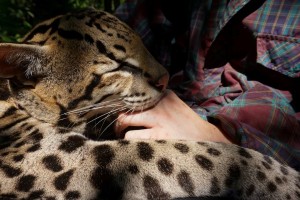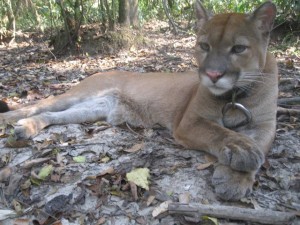Sometimes when our teams are out in the field, there just isn’t the time to sit down at a computer and send us updates on their progress. Many thanks though to Ella from this summer’s Bolivia project team, for sending us her thoughts after coming home – read on!
Ambue Ari : Working with the animals
Our routine at the park consisted of waking up and going straight to do our morning tasks – usually involving cutting up fruit and patuju leaves and feeding the house animals. These included tejones, pios, toucans, macaws, tapirs and chanchos. After breakfast, we would set off to look after our animals. There are twenty five cats on the park – Jeffrey’s cats, ocelots, pumas and jaguars – some are caged, and some are walked every day, as well as several monkeys and house animals. The cats are all worked with for a minimum of four weeks so that the volunteers can get to know them and form bonds and make sure they’re properly looked after.
I was allocated two cats – an ocelot called Vanesso and a puma called Carlos. Vanesso is eight years old – he was found when he was very young in a Chinese restaurant – he was being used as a tourist attraction and being kept in a cage. He has several health problems including renal and digestive issues due to not being properly looked after prior to his arrival at Ambue Ari. He has attachment issues due to being taken away from his mother at such a young age so therefore gets a bit upset when there are new volunteers because he knows that means another is leaving. Although he’s really grumpy and temperamental, he’s such an affectionate cat and likes nothing more than sucking on your fingers and licking your hands. He also spends a lot of time sleeping in sunny spots and stalking small animals like snakes and anteaters.
Carlos and his brother Juan were being kept as pets, and were rescued by CIWY when their owners tried to sell them in a market. Unfortunately, Juan died a few years ago when he ate part of Carlos’ collar, so it’s just Carlos now. He is six years old, and acts more like a Labrador than a puma – he walks so nicely and never gets aggressive, and makes sure he turns round several times when you are walking him to rub his head on your legs and give you a bit of affection. He’s relatively easy to walk, or so I thought, until one day a couple of weeks in he caught and killed a sloth (and then spent the next four hours wondering how to eat it as he’s never lived in the wild) – this goes to show that they are wild animals and although they’re being walked on a lead, they still have their natural instincts and can still be dangerous!
Before going out to my cats, I would collect the food that had been prepared that morning (usually consisting of chicken heads or bits of liver), along with water, cage keys and any medication they needed, and then set off to the cage with my partner. We’d then spend three hours walking the cats, feeding them, cleaning their cages and doing enrichment activities for them (such as planting plants or making toys).
I completely fell in love with both of my cats after working with them for only four weeks, all the animals have such distinct personalities and it’s really amazing how much you bond with them in such a short time – the feeling when they start to recognise you and try to communicate with you is like no other! Walking them was incredible – from seeing all the cool jungle plants and flowers to looking up and seeing brightly coloured birds and little spider monkeys swinging in the branches. I had such a phenomenal time at the park and will definitely make sure I return in the near future!
Click here to see how to join our next Bolivia project team in March 2016




